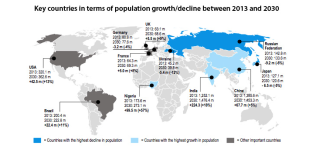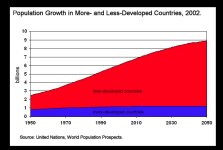Well if you don't want to be accused of putting words in someone else's mouth, here's a trick: Don't put words in someone else's mouth. Sure, it's no gold insurance, you may occasionally still be accused, people do make false accusations. It's just that you have no reason to complain after claiming bilby is making the exact opposite statement of the one you've just quoted.
I think the best way to resolve this is for me to allow that I may have been wrong and that bilby agrees that population
is a relevant factor in the problem.
So while he may have said that the
problem is independent of population, he meant (and I accept I may have interpreted it wrong) that while population is at least a part of the problem, the
solution is independent of population.
So, to try to summarise a correct interpretation of bilby's views on population, he agrees that current population, as a result of previous growth (and associated increased consumption/emission per capita) is a part of the problems with climate change, and that future growth, in terms of numbers of people, will in reality add to the problem in the short term (even if other measures reduce CO2 emissions, because decoupling from fossil fuels for example is not going to happen overnight) but that because of existing and predicted declines in the rate of population growth, the population part of the problem is, of itself at least, effectively already solved in advance by being self-correcting, so there is no need to actively do anything about it and we should focus only on the other measures.
If that's correct, I'm happier. I would however still disagree. I think the best approach would be to attempt to employ countermeasures on all potential fronts, including voluntary population growth reduction Family Planning for instance, along with all the other available countermeasures. As far as I am aware, this is a common opinion among the relevant bodies and authorities and at this point I am fine with going along with it, but I am fine with an emphasis on measures which would involve decoupling from fossil fuels for example.



